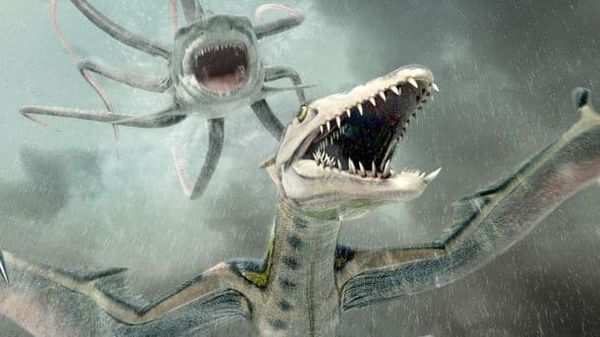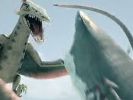Eye For Film >> Movies >> Sharktopus Vs Pteracuda (2014) Film Review
Sharktopus Vs Pteracuda
Reviewed by: Jennie Kermode

Despite its frankly stupid premise, the original Sharktopus was one of the most entertaining entries in the giant monster genre for some time, with a better developed plot than most such ventures, passable acting from the leads and a hybrid anti-hero with genuine charm. Its sequel, sadly does not live up to that promise, and feels like it's merely filling in time before the reportedly much better third entry in the series. It's likely to be remembered primarily for its gleeful dispatch of US TV presenter Conan O'Brien, which is fun, but not spectacular enough to carry the rest of the film.
Opening with a quick recap of bloody death scenes from its predecessor, the film plunges us straight into the action - the action that follows doesn't really live up to it, but it does have its moments. We meet scientists building hybrid monsters with the hope of selling them to the military. Enter pteracuda, part 'prehistoric dna' and part barracuda, with a resistance to bullets and explosions which is of uncertain provenance. It has a neural implant designed to let it be remote controlled, but when it is hacked by an enemy agent, trouble ensues and no bikini-clad beachgoer is safe.

What is to be done? Fortunately for the scientists, it emerges that the original Sharktopus had a child who was rescued from the sea by a researcher and raised in an oceanarium. There, a combination of sedatives and bonding with shapely trainer Lorena (Katie Savoy) has kept it out of mischief, even if it has got its tentacles a little too close to the occasional scantily clad tourist. Despite Lorena's protest, Sharktopus is pressed into action with its own neural control unit driving it to seek out pteracuda. Battle ensues - but, of course, it doesn't quite go the way the humans hoped.
Savoy makes a competent lead, which creates its own problems as she has to wait for other characters who are supposed to be in control to react to her. Opposite her, Robert Carradine (half brother of the late David, who was part of the same filmmaking set) hides behind the grim mercenary thing to minimise any obligation to communicate emotion. The less said about the rest of the cast, the better - but this isn't really a genre aimed at people who want to focus on humans. The biggest disappointment here is that pteracuda doesn't have much personality. Its habit of snapping people's heads off and then quickly wheeling back up into the air doesn't give us much opportunity to get to know it and it doesn't have the visual impact one might have hoped for.
Sharktopus, by contrast, secured iconic status in the original film and holds its own well here. The poignant addition of its flawed trust in a human woman - a device harking all the way back to the earliest days of cinema and films like the 1910 Frankenstein - gives it a bit of extra depth, and although it doesn't get to indulge in the fun gymnastics we saw from its parent, it still gets a few good action scenes. These are very watchable but leave the film unbalanced, and although pteracuda briefly charms with an attack on a plane, there's never really any doubt about who we're rooting for.
With a rather limp ending and a shortage of distinctive set pieces, this is a disappointing entry in the Sharktopus series, falling short of its potential. Shoddy CGI aside, the production values are high, and the involvement of Roger Corman guarantees good music, but the film never quite impacts as it should.
Reviewed on: 16 Sep 2016















